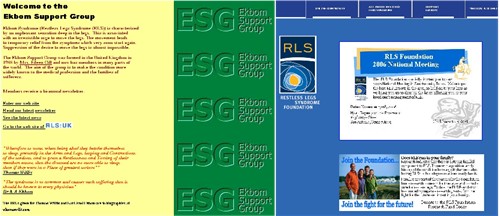It’s hard to do pharmaceutical marketing in the UK and the rest of Europe, which probably explains why my Pharma Marketing News subscriber list is only about 20% European.
Here’s just one example of how tough it is, especially in comparison to the US.
Recently, Insider over at the PharmaGossip Blog reported on a story in the UK about GSK’s support of the Ekbom Support Group. The story contained 3 things of interest to me:
- Ekbom Syndrome is another name for “Restless Leg Syndrome.”
- GSK was officially reprimanded by an “industry watchdog” set up by the Association of the British Pharmaceutical Industry (ABPI).
- GSK’s offense was a physician ad about Ekbom’s Syndrome that urged physicians to refer patients to the Ekbom Support Group website.
Let’s start with the ad.
At the time the ad was run, GSK did not have approval to market Adartrel — the brand name for ropinirole (ReQuip in the US) — for Ekbom Syndrome in the UK. And although the ad did not mention any drug name (not even the generic name), the Ekbom Support Group website did mention that the GSK drug ropinirole, marketed as Adartrel, was effective to treat the condition (see the story in the London Sunday Times: “Glaxo’s cure for ‘restless legs’ was an unlicensed drug“).
The “industry watchdog” — the Prescription Medicines Code of Practice Authority (PMCPA) — says that GSK broke the authority’s rules by promoting an unlicensed drug. “GSK was, in effect, directing patients to a website that contained misleading messages about the safety of ropinirole, which might indirectly encourage patients to ask their doctors to prescribe it,” the authority said.
This is incredible because (1) this sort of thing is commonly done here in the US and (2) the British drug industry actually slapped the wrist of one of its own, something that never happens here.
Disease Awareness Ads = New Reminder Ads
Case in point regarding (1): An industry critic here in the US testifying before the FDA suggested that disease awareness ads may become the “new reminder ads” when they merely drive consumers to branded promotions in other media such as the Internet. He cited a Pfizer TV ad on depression, which did not mention any product name but urged viewers to visit the web site depressionhelp.com, which is clearly a site that promotes Zoloft, Pfizer’s antidepressant drug. On the site, Lorraine Bracco, the actor who played a psychiatrist on the HBO show The Sopranos, says “[my doctor] put me on Zoloft (link to zoloft.com). I was also on therapy… And let me tell you something…getting treatment was the best thing I’ve ever done for myself.” (For more on this, see “FDA DTC Hearings Day 2“.)
PhRMA’s DTC advertising Guiding Principles — which is the closest we in the US have to the ABPI Code of Practice for the Pharmaceutical Industry — calls for the elimination of reminder ads. However, PhRMA’s enforcement of this particular guideline is dismal and despite at least one violation, PhRMA has not even reprimanded the offending companies (see “PhRMA’s Response – PRwise, it Stinks!” and “PhRMA Intern vs. BOTOX!“).
The last bit of this story that interested me is the Ekbom Support Group. It’s quaint that the group has stuck with the “old-fashioned” name, which honors Karl Axel Ekbom, the Swedish neurologist, born September 23, 1907, Gothenburg; died March 15, 1977, who first characterized the condition (officially called Wittmaack-Ekbom syndrome — I guess he had a collaborator).
Ekbom vs. RLS
The web site for the Ekbom Support Group, which was established 18 years ago, is also quaint. In fact, the web site must have been set up shortly after the group was founded! It’s to Web sites what the Model T is to cars. Compare it, for example, to the web site for the Restless Leg Syndrome Foundation, which said it was incorporated in 1992, yet the earliest press release available on its web site is dated November 14, 2005, just one day before the press announcement of FDA approval of Requip in the US. GSK and Boehringer Ingelheim are “Gold Level Sponsors” of the Foundation (see “Restless Pharma Marketing“).

The physician who first raised the complaint about the GSK ad says the Ekbom Support Group was “hijacked by GSK to promote restless legs syndrome and the GSK drug ropinirole.” GSK admitted giving the Ekbom Support Group administrative help, paying for headed stationery and the installation of broadband access. Not exactly a “gold sponsor” level of support! Surely, the Ekbom site could use a facelift.
Here is my summary of UK-style patient advocacy pharma support vs. US-style:
In UK: find an old-timey patient support group with the worst possible name for marketing.
vs.
In US: set up a slick new foundation web site the day before your drug is approved and name it and the medical condition something “snappy,” preferably with a three-letter acronym, and something marketable.
In UK: settle for a 75-yo spokesperson (ie, the founder of the Ekbom Support Group). Pay her (or her group) peanuts.
vs.
In US: hire an actress for lots of money who stared in a hit HBO series as a spokesperson. Actually, RLS doesn’t have a spokesperson, YET. Any nominations?









![6 Digital Tools at the Center of Healthcare Digitalization [INFOGRAPHIC]](http://ec2-54-175-84-28.compute-1.amazonaws.com/pharma-mkting.com/wp-content/uploads/2021/04/6DigitalTools_600px-100x70.jpg)




